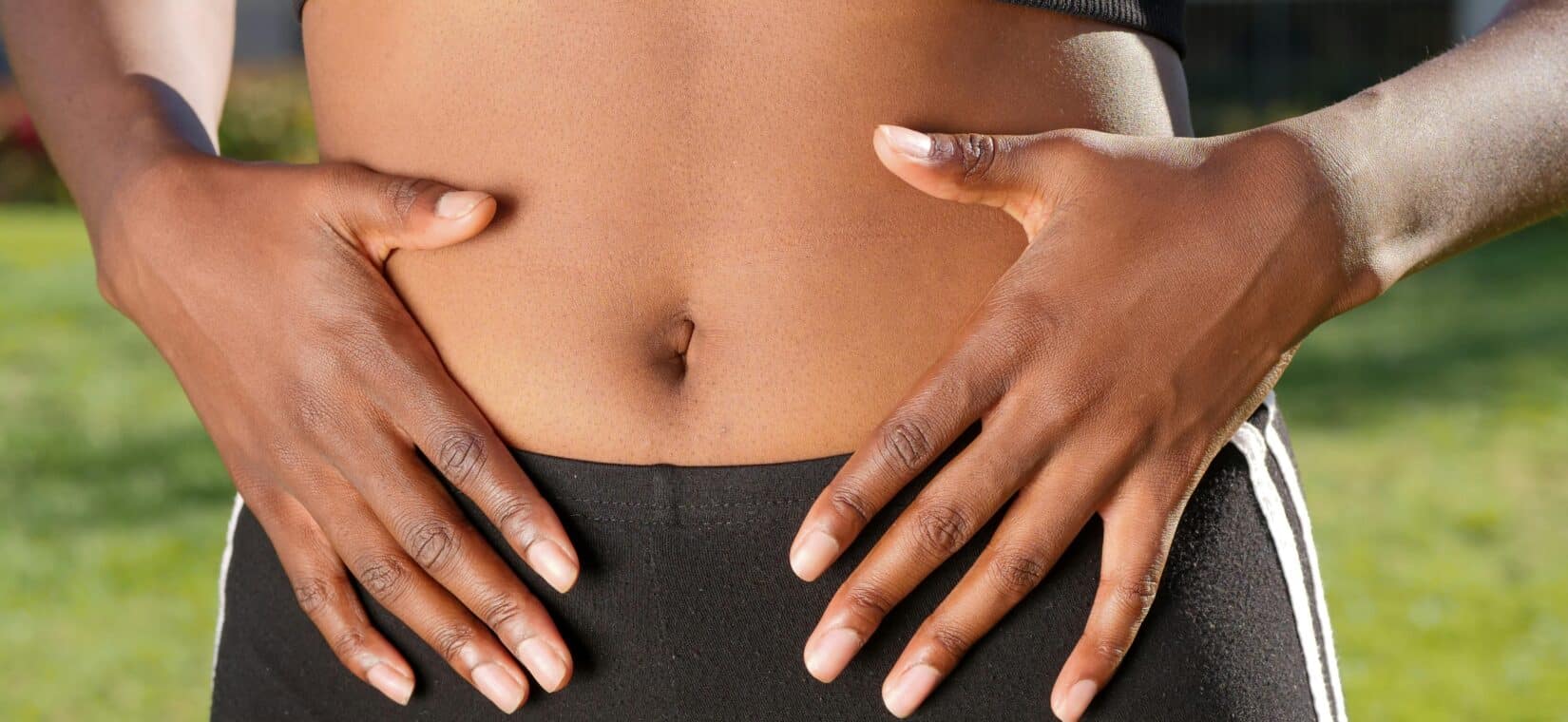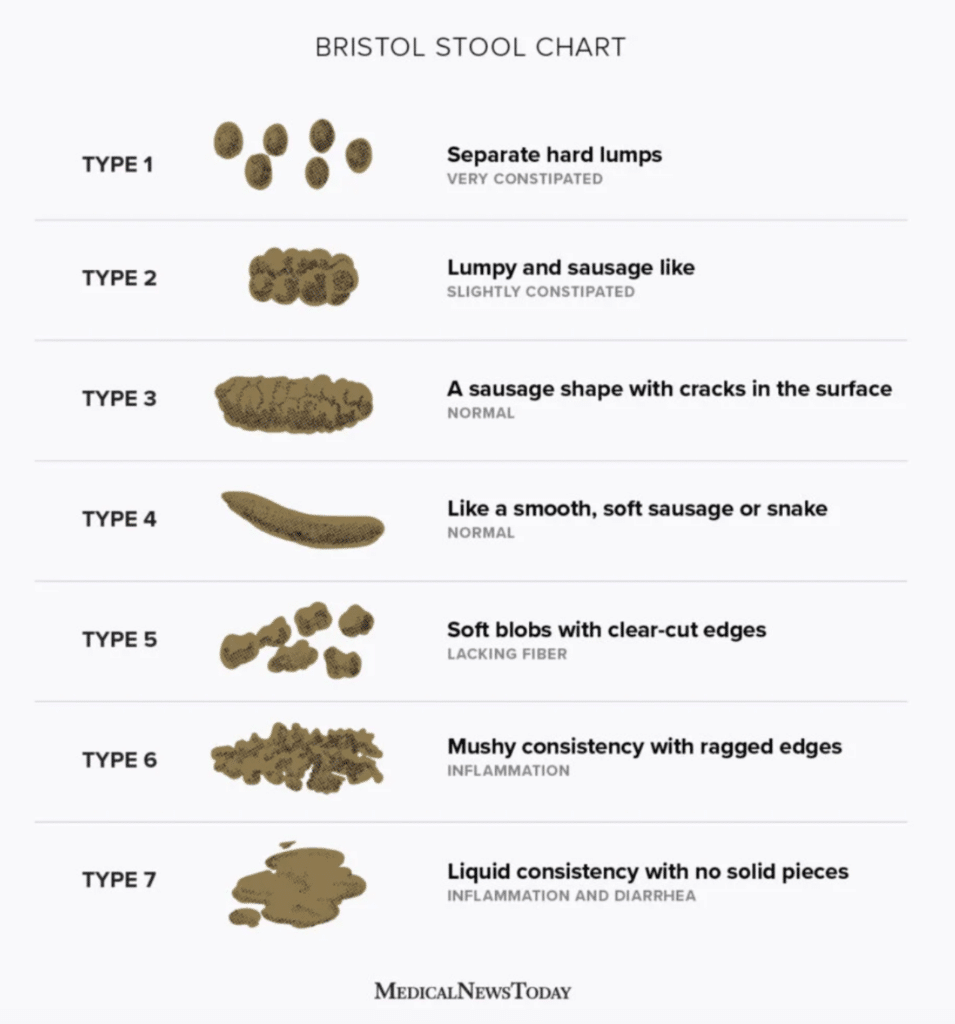Cultural taboos tell us that what happens in the bathroom should stay in the bathroom. As a result, poop really doesn’t get the attention it deserves. Still, awareness is rising in both the medical field and the general public of the importance of gut health and bowel movements. For health coaches, getting comfortable with this topic is crucial, as we can significantly impact our clients’ gut health and by extension, their overall wellness.
Every bowel movement provides insights into the body’s functioning, revealing what’s working well and what might need some attention. Health coaches can help clients understand these signals, encouraging them to listen to their bodies and self-advocate with their medical provider about gut health and digestion.
So whether you’re new to talkin’ poo or you’re a Bristol Stool Scale pro, we hope this article inspires you to listen to your body and get comfortable taking on a taboo topic with your clients.
Why We Poop: Digestion and Elimination

Everybody poops, but why? Where does poop come from and what purpose does it serve? Poop is essential to digestion, the process through which we fuel our bodies and then remove what we can’t use.
Let’s break it down: When you eat, your body initiates digestion in order to turn your meal into the fuel it needs to function. First, digestive enzymes do the intricate work of breaking down the food into molecules so tiny they can pass into your bloodstream. From there, those tiny nutrient molecules travel throughout the body to support its many processes, from muscle function to stress management to sleep.
Digestion enables you to execute all those body processes effectively—or not, depending on whether you’re nourishing your body with foods that contain the nutrients it needs. If your body isn’t getting the right fuel, you’re likely to feel it physically, mentally, and emotionally. Learn more about the gut-brain connection here.
By the time food reaches the large intestine, most of its nutrients and water have already been absorbed. Any leftover material, along with some dead cells and other bodily waste products, is what becomes your poop, and your body needs a way to get rid of it. The waste makes its way to the end of the intestines before exiting the body through the anus as stool.
If you’re still thinking, “Yuck! Why are we talking about poop?”, consider this: Without the ability to eliminate your bodily waste through bowel movements, that waste would build up inside you until your body was so full of poop, you simply couldn’t function. And THAT would indeed be gross.
Poop is the visible evidence of the body’s complex internal processes. Your body efficiently uses what it needs and gets rid of the excess—and that’s why everybody poops.
What Your Poop Might Be Telling You
Functional medicine providers often discuss poop with patients and recommend checking it after each bowel movement to ensure it’s normal. But what is “normal”? What should you look for?
One note before we get into the specifics: While it’s useful to monitor your poop, don’t obsess over it. Our bodies are complex systems and each bowel movement can vary, so a single instance of unusual stool doesn’t necessarily indicate a problem. Even the healthiest person won’t have a perfect, satisfying poop every single time they go (Did you know there’s a fun term for the feeling of a particularly satisfying bowel movement? “Poophoria.”) We recommend taking a peek in the toilet after you go, checking to see if there’s anything out of the ordinary, noticing if it becomes a pattern you might want to talk to your doctor about, and going on with your day.
If you’re ready to see what messages your poop is sending you, start by asking these questions:
What to Notice About Your Poop, and When to Call the Doctor
- What shape is it?
- What’s its texture/consistency like?
- How often am I going?
- Does it smell “normal” bad or particularly bad?
- What color is it?
- Call your doctor if your stool is bright red, black, or pale
- Was it hard or easy to pass?
- Call your doctor if you experience painful bowel movements
- Do I see any of the following: Mucus, fat, blood, a lot of undigested food?
- Call your doctor if you see blood, mucus, or pus
The good news is that “normal” poop is a very broad definition. For example, poop in shades of browns, greens, and yellows can all be normal, but so can red/pink if you just ate beets, or black if you took an iron supplement. That said, if you see a color that’s outside what’s normal for you, especially red, black, or gray, it’s best to contact your medical provider to make sure it’s not a sign of something else going on.
Shape is another important feature of your poop. We recommend checking out the well-known Bristol Stool Scale (below) for an easy visual guide to determining if you’ve had a healthy poop. As a general rule, a smooth or slightly cracked sausage shape—types 3 and 4—are “normal” stool, but again, our bodies work differently, and you and your medical provider know best what normal is for you.
How often should you poop? Again, your healthy normal is what’s most important. Each of us has a different “transit time”—how long it takes for food to move through our system and come out the other side—as well as different diets, stressors, activity levels, and other factors that influence frequency of elimination. As a general rule, it’s healthy for many people to poop between three times per day and three times per week.
Not sure if your normal is “normal”? If you pass stools without discomfort, they’re generally a type 3 or 4 on the Bristol Scale, and you’re comfortable with the frequency you’re going, then it’s likely that you’re doing great.
Why do some people poop more often than others do? One big reason: fiber. If you eat a mostly plant-based diet, you might poop more often thanks to all that dietary fiber and the water it soaks up, which increases the volume of your stools. If you eat more meat and animal products and/or more processed foods, you might poop less often. Another big reason: Age. Young infants and children may go multiple times a day, whereas adults tend to go less frequently than that.
Interested in having healthier bowel movements? Keep reading for tips on improving gut health for healthier and more satisfying poops.
Common Stool-Related Medical Issues
Many common conditions and non-communicable chronic illnesses affect gut health overall and bowel movements specifically. These include:
- Constipation: Infrequent and/or hard-to-pass bowel movements
- Diarrhea: Loose, watery, or liquid bowel movements
- Irritable Bowel Syndrome (IBS): Common chronic disorder of the gastrointestinal tract, often with symptoms of constipation, diarrhea, or both
- Inflammatory Bowel Disease (IBD): Group of autoimmune conditions that includes Crohn’s disease and ulcerative colitis
- Celiac disease: Autoimmune disorder in individuals with an intolerance to gluten that primarily affects the small intestine
- Diverticulitis: Gastrointestinal disease in which a patient develops inflamed pouches in the wall of the large intestine
- Hemorrhoids and anal fissures: Two often painful conditions of the anus that can be caused or irritated by passing stool
These conditions—many of which are on the rise across the world—tend to manifest at least in part by disrupting the normal functioning of the digestion and elimination process. They may be a root cause of illness or just one of a few symptoms of a larger systemic dysfunction. If you are concerned about any of these conditions, talk to your doctor about your symptoms.

8 Tips to Have a Healthy Poop
If you’re a health coach working with a client who wants to improve their poop experience, there are a few general recommendations we can make, while noting that each individual will have their own specific needs and tweaks:
- More Fiber: More dietary fiber increases the bulk/volume of your stools.
- Proper Hydration: More water can soften stools and ease constipation.
- Gentle Movement: Walking, yoga, and simple stretches like squatting can stimulate your bowels to move.
- Gut-friendly foods: Nurture a healthy gut with probiotics like those found in kimchi and sauerkraut, kombucha, and yogurt with live active cultures.
- Manage stress: Stressors can cause the gut to close for business. Try a mind-body medicine technique like meditation to help reduce the impact of stressors.
- Deep squat: If you use a typical Western-style sitting toilet, try a “toilet stool” that lifts your knees above your hips so that you’re squatting. This position can feel more natural and prevent straining while you go.
- Candle breath: When you’re having a BM, make sure you’re not holding your breath. Try inhaling deeply into your belly, then exhaling like you’re slowly blowing out a candle.
- Avoid straining: Don’t “bear down” or force yourself to expel a BM—if it doesn’t come out on its own, then it’s probably not quite time. Poop should come out with minimal exertion.
Digestion and Healthy Poop for Health Coaches
As gut health gains increasing attention, health coaches who are comfortable discussing digestion can set themselves apart. Common gut-related conditions like IBS, IBD, and Celiac disease are often incredibly disruptive and distressing, yet sufferers may feel embarrassed by their symptoms and struggle to advocate for themselves with their doctors. A coach can help change that.
By confidently and empathetically opening up the topic of bowel health, a health coach can help clients feel comfortable sharing their experiences. This, in turn, empowers them to advocate for their gut health, leading to better communication with their healthcare providers, more informed dietary choices, and ultimately, improved overall wellness. Positive changes in bowel movements don’t stop at the gut—they ripple out to impact overall wellness, including immune function, energy levels, and mood. This holistic understanding allows you to offer support that truly makes a difference.
Coaches can also connect their clients to advances in the science of gut health. Clients who are curious about optimizing their gut health may be interested in innovations like microbiome testing (learn more in our recent webinar on microbiome testing here). By developing fluency in this emerging field, you set yourself apart and create a unique value proposition for your coaching services.
The next time a client hesitates to discuss poop or digestion, seize the opportunity. Let your knowledge of gut health shine—it will attract your ideal clients, and they (and their guts) will thank you for addressing the real issues that impact well-being. Your comfort and knowledge in this area could be the key to unlocking better health outcomes for them, and new pathways for your coaching practice.





